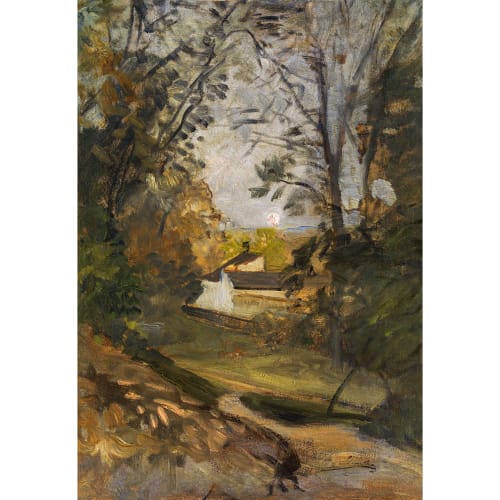Emil Jakob Schindler, probably the most important Austrian landscape painter in the second half of the 19th century, studied at the Vienna Academy of Fine Arts under Albert Zimmermann, who was also the teacher of Eugen Jettel, Rudolf Ribarz and Robert Russ. In Vienna, the influence of ‘paysage intime’ had brought about a fundamental change in the development of landscape painting. Schindler occupied a special position here. While Jettel and Ribarz spent many years in France and thus experienced a direct confrontation with French plein-air painting, Schindler's studies of 17th century Dutch painters and numerous journeys - Dalmatia, Venice, Holland, Istria and Corfu - and a short stay in Paris were decisive. He broke away from atmospheric realism, as taught at the Vienna Academy, and found his own view confirmed in the debate with Corot and Daubigny, which favoured a reduction of the picture detail, light tonality and a sketchy style of painting. Schindler is the main master of this specifically Austrian mood impressionism - he himself described his painting as ‘poetic realism’, as his endeavours were not only aimed at capturing an external, optical reality, but also an inner, emotionally determined truth. From the mid-1980s, he lived in the romantic castle of Plankenberg in the Vienna Woods. Schindler was soon and increasingly honoured with awards.
L. Hevesi, Österreichische Kunst im neunzehnten Jahrhundert, Leipzig 1903, p. 254ff; C. Moll, ‘Emil Jakob Schindler’, Vienna 1930; B. Grimschitz, ‘Österreichische Maler vom Biedermeier zur Moderne’, Vienna 1963, p. 33ff; H. Fuchs, ‘Emil Jakob Schindler’, Vienna 1970, with references; G. Frodl and others, catalogue for the exhibition ‘Stimmungsimpressionsmus’, Österreichische Galerie Belvedere, Vienna 2004; exhib. cat. Cat.: Agnes Husslein-Arco /Alexander Klee (ed.): ‘Emil Jakob Schindler - Poetischer Realismus.’, Österreichische Galerie Belvedere, Vienna (exhibition 27 Sept. 2012 - 13 Jan. 2013), Munich 2012; reference works: Wurzbach, Thieme-Becker, Müller-Singer, Bénézit, Boetticher, Busse no. 71766
